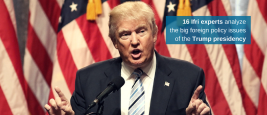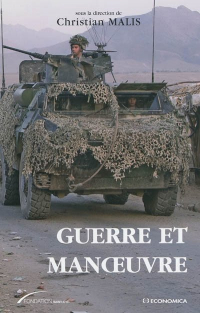
Corentin BRUSTLEIN
Former Director of Ifri's Security Studies Center
Research Interests:
- French and U.S. defense policies
- Nuclear policies, proliferation, arms control and disarmament
- Future conflict
- Military technologies and capabilities
Dr. Corentin Brustlein was the Director of the Security Studies Center at the French Institute of International Relations (Ifri) from 2015 to 2021. Prior to assuming this role in 2015, he had been the head of the institute’s Deterrence and Proliferation program. His areas of expertise include nuclear and conventional deterrence, strategic stability and arms control, U.S. and French defense policies, and force projection and conventional warfare. At Ifri, he was also the editor of the Proliferation Papers, he contributed from 2008 onwards to the various activities conducted by the joint civil-military research unit established at Ifri (LRD), and bloged at Ultima Ratio.
Dr. Brustlein holds a Ph.D. in political science from the Jean Moulin University of Lyon, and has taught strategic studies, strategic analysis, and international relations theory at Sciences Po Paris, the Jean Moulin University of Lyon, and other academic institutions.
France’s current presidential campaign has created an unprecedented situation fuelled by revelations and a total absence of restraint, but it has not truly taken account of the disruptions of the last year: Brexit, the attempted coup in Turkey, the election of Donald Trump, the recapturing of...
What will become of US foreign policy under Donald Trump? A selection of Ifri researchers has come together to offer their thoughts on this question. Our experts cover an array of topics through 14 contributions, ranging from the future Sino-American relations, through US engagement in the...
Over the last few decades, in order to limit the risk of collateral damage, tailoring the effects of firepower has become a main concern for Western armed forces.
About a decade ago, the U.S. started to examine options to develop and acquire Conventional Prompt Global Strike capabilities. This move fits in an effort to conventionalize deterrence, an effort initiated decades before and undertaken for profound and diverse motives. Although it has been...
Chapter published in Harsh PANT (ed.), Handbook of Nuclear Proliferation, Abingdon, Routledge, 2012, pp. 116-131.
For more than a decade, US defense circles have been concerned about the emergence of capabilities and strategies, which, as they spread, risk imperiling the United States" position in the world by their ability to disrupt or prevent force projection operations. Though most of the literature...
Force projection has become a general posture and a fundamental dimension of the influence Western powers intend to exert over the world by means of their armed forces.
Chapter in French published in Christian MALIS (ed.), Guerre et manoeuvre. Héritages et renouveau, Paris, Economica, Collection "Stratégies et doctrine", 2009, pp. 38-55.
The concept of strategic surprise has rarely been defined precisely and generally conveys the idea of a badly or non-anticipated threat which unexpectedly hits a state, shaking its conceptions and its position towards security. Until the 1980s strategic surprise would take the form of a...













